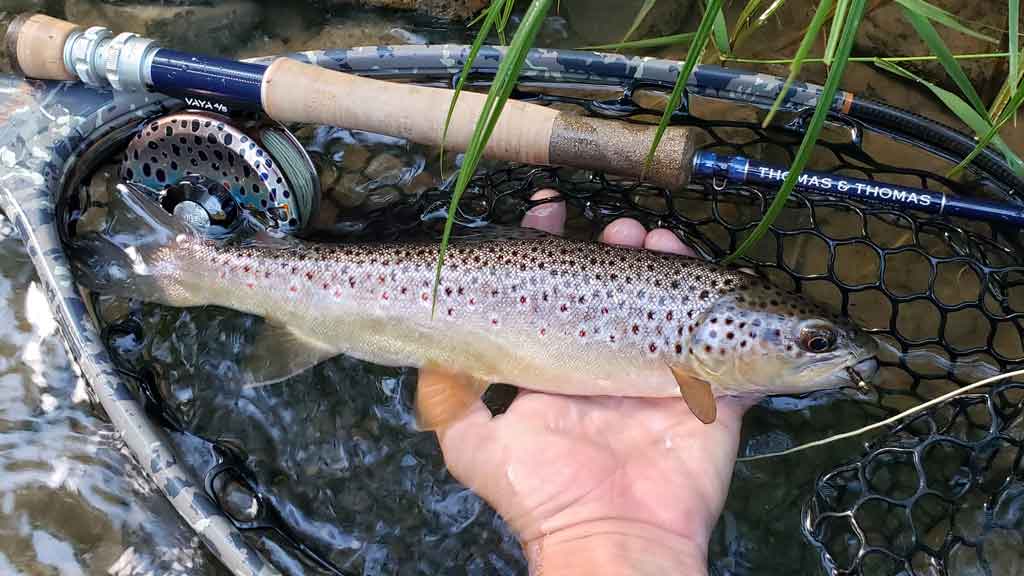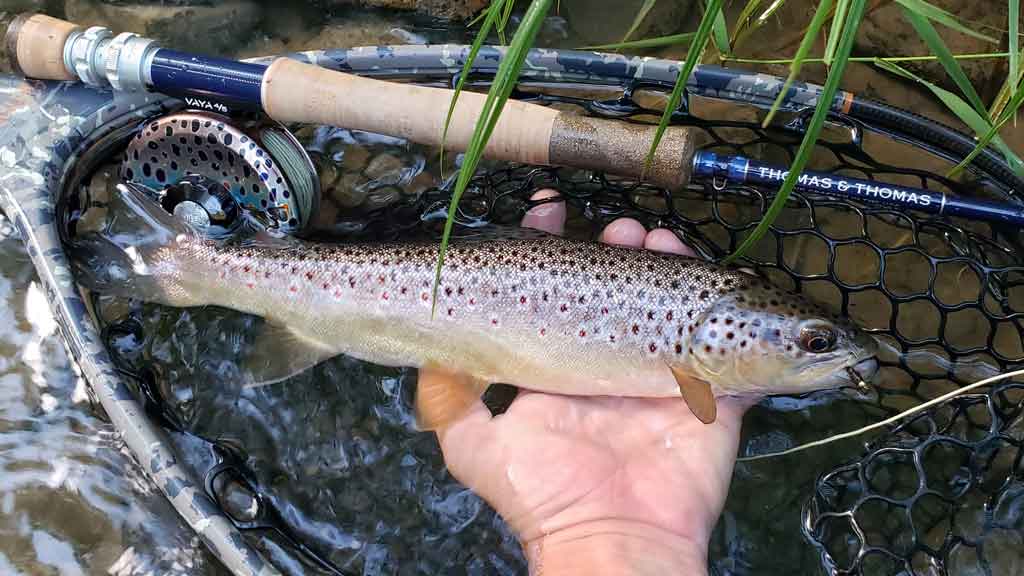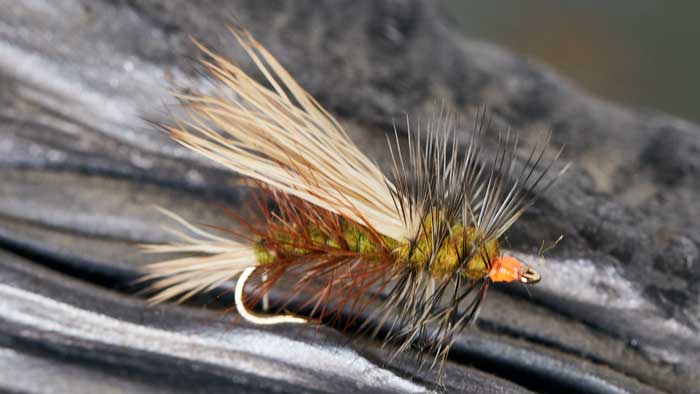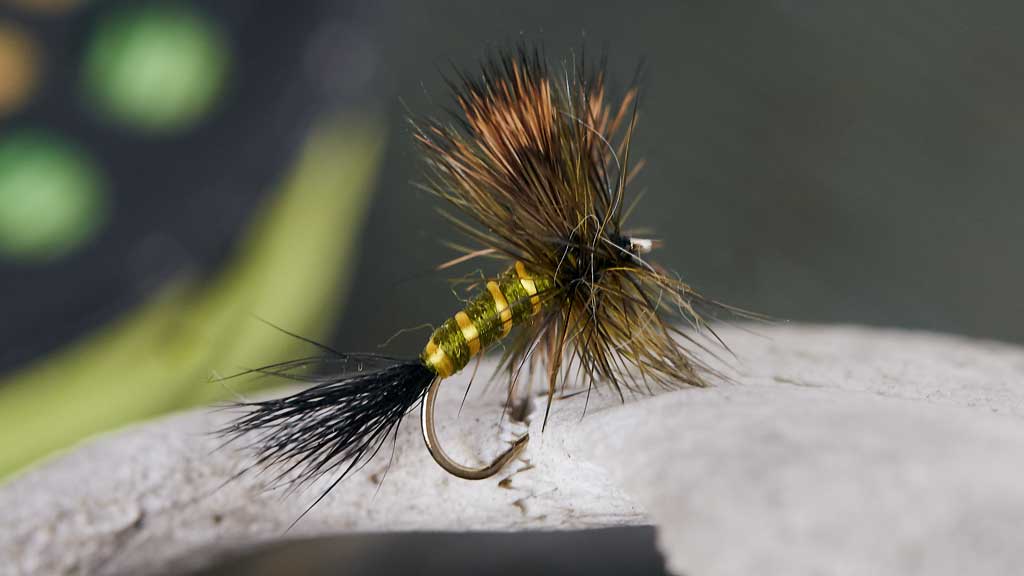Fishing has so many techniques and methods that it might be hard for you to determine the right approach. Many consider fly fishing as just casting a fly line out into the water and hoping for the best, but you can use many techniques with a fly rod to improve your success.
One of the most popular and effective ways to fish with a fly rod is by using a technique known as nymphing, also referred to as "nymph fishing" or just plain "nymphs." Many anglers claim that nymphing is the best technique for catching fish under challenging conditions.

Is Nymphing Fly Fishing?
As a general rule nymphing is a form of fly fishing. Traditional fly fishing techniques include casting, false casting, and mending your line for an appropriate presentation of an artificial fly to catch a fish.
However, there are specific characteristics of this type of fly fishing that you need to be aware of to help you determine if this is a technique that you want to use or not. To get a definitive answer, let's first examine the concepts of fly fishing.

What Is Fly Fishing Exactly?
Fly fishing has been around for hundreds of years and is still a popular method of fishing today. So whether you're near a stream, river, or even a lake, if these areas have fish in them at all, there's a good chance that somebody may be fly fishing for those fish.
The question isn't so much about what nymphing is as what it is concerning fly fishing. The easy answer is that fly fishing uses a rod and reel, just like any other type of fishing. However, it's far more complicated than that. For example, you're not using worms or lures when fly fishing; instead, your line is attached to what most people refer to as "flies."

These flies are specially designed to look like real insects, with one significant exception - they are tied on the end of your line to imitate the movements of these insects. In addition, your fly will be attached to a leader, which is constructed from either monofilament or fluorocarbon material.
However, just because you attach the flies doesn't mean that you're ready to go fishing. The flies will need to be rigged specifically to float through the feeding zone of your particular target.

What Is Nymphing?
There are many techniques, styles, and methods in fly fishing, but there's no question that nymphing is perhaps one of the most fascinating. What exactly is nymphing? Nymphing is very much like bait fishing combined with fly fishing. It involves using one or more files tied to a line commonly referred to as tippet.
The purpose of using this type of fly is to represent the aquatic lifecycle of an insect, such as a mayfly or midge. When you use nymphing as your method for fly fishing, the flies will be drifting underwater and suspended near the surface of the bottom of the water column to imitate an aquatic insect that has floating off the bottom surface of a river, stream or lake bed.

The Techniques of Nymphing
There are many different types of nymphing techniques that you can use when fly fishing, including high stick nymphing or contact nymphing and indicator nymphing. In addition to the method used, you'll also need to be aware of the type of flies you're using for your nymphing, the weight of the flies, and even where you're located. A general rule of thumb is that you'll use smaller flies when fishing in small streams or pressured tail waters than you would when fishing in larger rivers.

For example, if you're using a two-fly rig with your nymphs to fish on a larger river, you might only use two flies when fishing in a smaller stream. Also, because the water is shallower in these types of streams, you'll be able to get away with using lighter-weight nymphs as well rather than having to use heavier nymphs for deep water.
Also, just because you might use the same weight nymphs in both small and large streams, this doesn't mean that they'll be suspended in the water at precisely the same depth. Therefore, when using larger flies, you may have to adjust your leader length and add on additional weight such as split shot depending on how deep or shallow the stream is.

How Do You Fly Fish a Nymph Fly?
When you're fishing with nymphs, the type of nymphing you perform will depend on whether your fly is above or below the water. There are plenty of opinions on how to fish a nymph in different ways, but what's most important here is to be able to get it done regardless of where you might be fishing.
Here are the two primary approaches:
Nymphing with a Drop Shot Presentation
If you're nymphing a drop shot presentation, then you'll need to attach your weight or split shot directly below nymphs. The best way to do this is to add split shot to an extra length of tippet or a heavy point fly that has significant weight. Then attached another section of tippet and connect your second fly using a double surgeons knot to your leader.

Then, you'll cast out into the water with your line fully extended, allowing the weight of the splitshot to help it make contact with the bottom of the stream or river. Once your flies are on the bottom, you can wait for a fish to strike or deliberately pull on your line to move the flies and then wait for another strike.
Nymphing with an Extended Trailer
If you're nymphing in different depths of the water column, then it is helpful to attach your weight above your fly closer to your leader as opposed to having it attached under the the point fly.
In this case, you can add split shot to rig as needed to get it to the correct feeding depth that you are targeting.

In both cases, you'll want to use a leader that's between seven and nine feet long, so your fly will be able to stay in the water at a proper depth throughout the day.
Check out our article on fly fishing with and indicator for more information.
Is Fly Fishing Good in the Evening?
There is a lot of debate about whether fly fishing is good in the evening or not. It's not necessarily true that fly fishing is better in the morning or the evening; it all depends on what you're trying to catch and the insect hatches that are happening in your location.
If you're targeting large fish, such as muskie, pike, and trout, then your best bet would be early in the morning when these fish are most active. If you're targeting trout or bass, then the early morning and early evening can be great time depending on the season. If you're planning on nymphing or dry fly fishing, then it's recommended to follow a seasonal hatch chart for the best time for bug activity.
What Is the Difference Between Nymphing and Wet Flies?
In terms of their structure, nymphs are very different than wet flies and soft hackles. There are some similarities, but they're essentially different types of flies that can be used on two very different techniques.
Nymphs are typically smaller with a wing case, thorax and body. Some are also tied with weight that makes it easier to get to the feeding zone and provides more action for your nymph once it starts traveling through the water.
On the other hand, Wet flies are essentially traditional flies that are designed to look like insects. They're typically tied with a "wing" on either side of the hook and feature two sets of hackle wings at the top.
While wet flies can be used for nymphing techniques, they can be fished using standard dry fly and streamer fishing techniques as well.
What Is a Nymphing Fly Line?
There are several types of fly lines that work for nymphing techniques. The first thing you need to consider is whether or not you're going to be using a floating line or sinking line.
As a general rule a typical floating line can be used for both nymphing and dry fly fishing.
Sinking lines are typically used for still water presentations and streamers.
Check out our article here on different fly line presentations for different flies.
So is nymphing fly fishing? Yes, but it's also very different from conventional dry fly fishing since you don't use flies that are attached to the end of your fishing line to mimic insects on the surface of the water. Instead, you're using a weighted fly and letting it drift or sink to the bottom of a stream or river, which is very different from conventional fly fishing.

About the Author
Matthew Bernhardt, a third-generation Coloradan, grew up at the forefront of the state’s fly-fishing revolution, enjoying time on the water, side by side with experienced guides and lifelong anglers.
By combining his passion for fly-fishing with input from other experienced fly-fishers and guides and his fine arts degree from Colorado State University, Matthew spent five years carefully developing the Drifthook Fly Fishing System, built to help every angler catch more trout.




